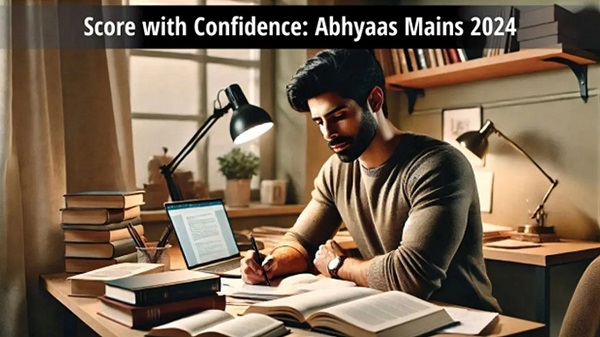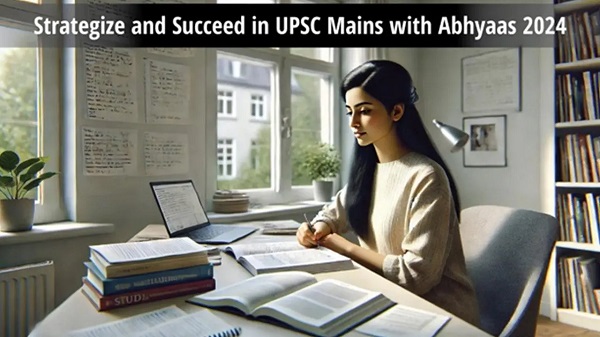As the UPSC Mains draw closer, the real challenge isn’t just about covering the syllabus-it’s about mastering it with precision and clarity. With only a month left, it becomes essential to sharpen your analytical skills and ensure that your answers in General Studies Paper 3 are not only comprehensive but also well-articulated and precise.
This blog will guide you through strategic preparation for GS Paper 3 and demonstrate how Abhyaas Mains 2024 can play a pivotal role in your journey toward UPSC success.
Maximize Your Score in GS Paper 3
To excel in GS Paper 3, it’s crucial to focus on the sections that hold the most significance and ensure your answers are backed by robust data and clear examples. Here’s how you can strategically approach each topic:
A) Economics
In the past five years (2019-2023), Economics has contributed 41 questions to GS Paper 3, with a focus on several key areas. Questions have frequently examined government schemes and policies, such as PM KISAN, MGNREGA, and the National Health Mission, assessing their effectiveness in driving economic growth.
Another significant theme has been banking and financial reforms, including the Insolvency and Bankruptcy Code (IBC) and reforms within the banking sector, alongside the role of the RBI.
Agriculture and allied activities also feature prominently, with questions on Minimum Support Prices (MSP), farm subsidies, and reforms in agricultural marketing. Lastly, Sustainable Development Goals (SDGs) have been a recurring focus, with questions evaluating India’s progress toward achieving economic inclusivity and sustainability.
Preparation Strategy:
- Incorporate Statistics and Examples:
Use relevant data from authoritative sources like the Economic Survey, Union Budget, and NSSO reports to substantiate your arguments. This adds credibility to your answers and demonstrates your understanding of current economic realities. For example, while discussing the impact of government schemes, back up your points with statistics on their reach and effectiveness. - Reference Constitutional Articles, Committees and Policies:
Linking economic policies to Constitutional provisions (e.g., Article 39 for equitable distribution of wealth) strengthens your answers. Additionally, referencing government schemes and policies, such as PM KISAN, provides depth and context, showing that you understand both the legal and practical frameworks guiding economic governance. - Highlight Best Practices and Case Studies:
Drawing from successful examples in India or globally helps illustrate your points more effectively. For instance, referencing the Pradhan Mantri Fasal Bima Yojana (PMFBY) as a case study of agricultural insurance can enrich your answer on risk management in agriculture. Highlighting economic experts’ views can also provide a well-rounded perspective.
B) Internal Security
Internal Security contributed 20 questions between 2019 and 2023, with a strong emphasis on key issues. Cyber security threats have been a major theme, with questions assessing India’s readiness to counter cyber-attacks and safeguard its digital infrastructure.
Another crucial area has been terrorism and insurgency, with a focus on counter-terrorism measures, insurgency in the Northeast, and the effectiveness of government policies like UAPA and the National Investigation Agency (NIA). Additionally, border management has been an important theme, covering the challenges India faces on its borders with Pakistan and China, and the role of paramilitary forces in maintaining security.
Preparation Strategy:
- Understand Current Challenges: Stay updated on current internal security challenges and the government’s responses. This includes cyber security measures, counter-terrorism strategies, and anti-insurgency operations.
- Support with Data and Case Studies: Use data and examples to strengthen your arguments. Where relevant, link security issues to governance and international relations for a comprehensive perspective.
C) Science and Technology
Science and Technology has featured prominently in GS Paper 3, contributing 17 questions between 2019 and 2023. A dominant theme has been artificial intelligence (AI) and automation, with questions exploring the impact of AI on sectors such as healthcare, education, and governance, as well as associated ethical concerns.
Biotechnology and genetic engineering have also been recurring topics, particularly the application of biotechnology in agriculture (e.g., GM crops) and healthcare, along with discussions on ethical implications. Furthermore, space technology has garnered attention, with a focus on India’s space missions like Chandrayaan and Mangalyaan, and ISRO’s international collaborations, emphasizing their strategic importance for India.
Preparation Strategy:
- Stay Updated: Focus on understanding the latest advancements in AI, biotechnology, space technology, and other relevant fields. Government initiatives and their societal impact should be a core part of your preparation.
- Use Visual Aids: Utilize diagrams and flowcharts to explain complex concepts, ensuring your answers are both clear and impactful.
D) Environment & Disaster Management
Environment & Disaster Management has contributed 22 questions over the past five years, reflecting a range of critical issues. A significant portion of the questions focused on climate change and global agreements, exploring India’s role in international accords such as the Paris Agreement and the effectiveness of the National Action Plan on Climate Change (NAPCC).
Biodiversity conservation has also been a recurring theme, with questions addressing the conservation of endangered species, the role of protected areas like tiger reserves, and initiatives like CAMPA. Additionally, disaster preparedness and response have been vital topics, with an emphasis on the National Disaster Management Authority (NDMA) and the effectiveness of early warning systems in mitigating disaster risks.
Preparation Strategy:
- Link Topics to Policies and Agreements: Stay updated with the latest developments in environmental science, global agreements like the Paris Agreement, and government policies. Highlight the interconnections between environmental issues and other GS papers, such as their impact on the economy and governance.
- Use Maps and Diagrams: Incorporate maps to depict geographical aspects of environmental challenges and use diagrams to clarify disaster management strategies.
PYQs and Toppers’ Copy Analysis
A critical step in refining your preparation is analyzing Previous Years’ Questions (PYQs) and reviewing Toppers’ Copies. This process provides valuable insights into exam patterns and effective answer-writing techniques.
- Review PYQs: Analyzing the questions from previous years helps identify recurring themes and important topics that you should prioritize. This ensures that you are focusing on areas with the highest likelihood of being tested.
- Study Toppers’ Copies: Observing how successful candidates structured their answers, incorporated key terms, and presented their arguments provides practical insights into effective answer writing. Adopting these techniques can significantly enhance the quality of your own responses.
Abhyaas Mains 2024: Your Key to Success in GS Paper 3
As you enhance your understanding of these crucial areas, translating your knowledge into top-quality answers is essential for standing out in the exam. Our Abhyaas Mains 2024 – All India Mains (GS + Essay + Optional) Mock Test is designed to help you refine your preparation and achieve excellence in your exam performance.
Driven by our Innovative Assessment System™, developed through extensive research, Abhyaas aligns with the latest UPSC exam trends while reflecting the complexity of the actual exam. This system has consistently shown a strong correlation between Abhyaas scores and actual UPSC marks, particularly in GS Paper 3.

Abhyaas Mains 2024 offers you a tailored approach to mastering GS Paper 3:
- Realistic Exam Simulations: Experience the pressure and rigor of the actual UPSC Mains by practicing in a controlled, exam-like environment.
- Focused Content: Concentrate on high-impact topics that are crucial for success in GS Paper 3.
- Detailed Feedback: Receive personalized insights that highlight your strengths and identify areas that need further improvement.
Scheduled for the 24th, 25th, 31st of August, and 1st of September across 40+ cities, the Abhyaas Mains 2024 program is your pathway to perfecting your preparation and achieving top marks.
In these final days, the emphasis should be on refining your knowledge, honing your answer-writing skills, and practicing under exam-like conditions. With a strategic approach and the support of programs like Abhyaas Mains 2024, you can maximize your potential and approach the UPSC Mains with confidence.
Visit us at: https://visionias.in/abhyaas/login-form.php
Or Call us at: 8468022022, 9019066066




